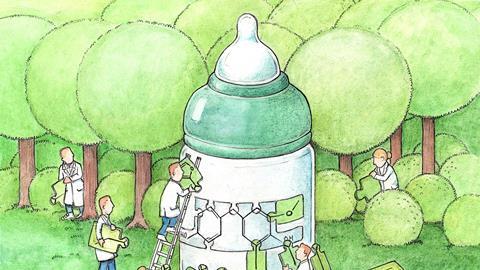Researchers from Leuven describe in Nature Sustainability how they are using building blocks from wood oil to make more sustainable alternatives to the widely used but harmful plastic bisphenol A.
Bisphenol A (BPA) is mainly used in polycarbonates and epoxy resins, but also in niche products such as dental fillings. It has excellent properties, but also major drawbacks: it can leach out of the products in which it is used, and it has also been found to be an endocrine disruptor. BPA interferes with oestrogen activity in humans. There is now talk of an imminent European ban. In practice, many (simple) bisphenol alternatives are not good substitutes either; they are at least as harmful.
Bert Sels’ group at KU Leuven wanted to make a truly sustainable alternative. ‘Our group mainly works on the conversion of biomass into chemicals,’ says Laura Trullemans, a postdoctoral researcher in Sels’ group and, together with Steven-Friso Koelewijn, first author of the Nature Sustainability paper. ‘Now it turns out that biomass can provide us with exactly the substrates we need to synthesise safer structures that also have the functional core of a bisphenol. So one thing led to another and we ended up with safer and more sustainable alternatives.’
Zeolite
The conventional synthesis of p,p’-bisphenols is based on the use of substances derived from the fossil industry, such as ketones, aldehydes and phenols. These are converted via hydroxyalkylation-alkylation condensation with, among others, unstable thiol catalysts. The Leuven group’s idea is to start with p-alkenylguaiacol and convert it to bisguaiacol via Friedel-Crafts alkylation. You don’t need volatile or sulphur catalysts, you don’t release any water and you don’t need anything from the fossil industry. Another advantage is that you can use an industrial zeolite catalyst, which you can also recycle later. The resulting bisguaiacol is very similar to the bisphenol, but has an ortho methoxy group in addition to the para-hydroxy groups.
It was particularly important for the researchers to consider potential adverse effects at the design stage of the alternatives. ‘In the ‘safe and sustainable by design’ vision promoted by the European Union, it is important to carry out toxicity tests on new molecules in the early stages of development. It makes no sense to produce an alternative only to find out later that it is just as harmful and no more sustainable than the original,’ says Trullemans. The paper therefore includes a section on the estrogenic activity of bisguaiacols, and it is indeed much lower than that of the original; in some cases, the activity is even absent down to mM concentrations.
Wood
The bisguaiacols developed by the group are therefore very promising, continues the postdoc. ’We have produced materials from them and the properties are very similar to those of BPA. For example, the glass transition temperature is above 100 degrees Celsius. This is slightly lower than BPA, but still very good.’ To further underline the sustainability of these alternatives, Trullemans and colleagues have made the guaiacols directly from wood. ’A colleague of mine specialises in converting wood into oil. From this oil, I made simple extractions and extracted the alkenyl guaiacols. We then used this extract in our bisguaiacol synthesis.’
The biggest challenge now is to scale it up and bring it to market. Trullemans: ‘We are now making ten to thirty grams on a laboratory scale and I would like to get to one hundred grams. We now also have a two-hundred-litre reactor in our group, with which we hope to demonstrate the synthesis of substrates for bisphenol alternatives from oil.’ The group will initially focus on niche markets or markets where regulatory pressure is high. ’In the short term, the commodity market is not immediately feasible. But in the long term, I strongly believe in it. It is already a safer alternative, and the step towards a sustainable circular economy will have to be taken at some point anyway.’
Bert Weckhuysen, A sustainable alternative to bisphenol A, News&Views, Nature Sustainability (2023)













Nog geen opmerkingen